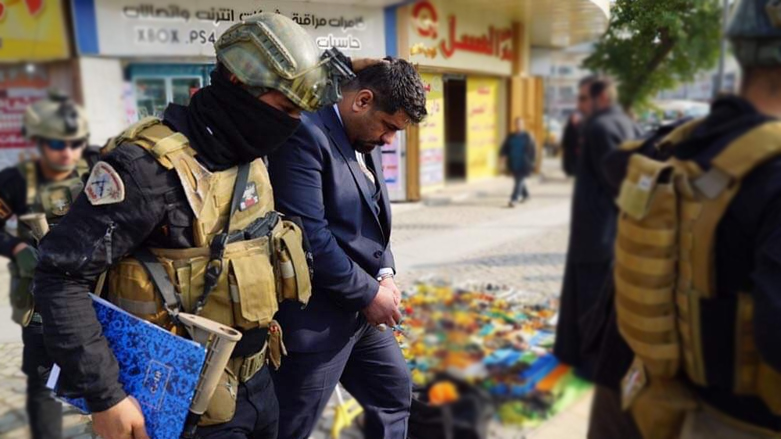Iraqi militias crack down on several ‘fake headquarters‘

ERBIL (Kurdistan 24) – Iraq's Hashd al-Shaabi militias, also known as the Popular Mobilization Forces (PMF), have closed down a number of “fake headquarters“ in Baghdad belonging to groups they say were falsely claiming to be within their organization. The intensive crackdown began after the head of one of the groups was publicly critical of Iran's influence in Iraq.
Initially, a group of PMF fighters stormed the headquarters of the Abu al-Fadhl al-Abbas Brigade on Thursday in central Baghdad’s Karrada district and arrested its leader, Aws al-Khafaji.
The action came days after Khafaji appeared on a local Iraqi television channel to talk about the recent assassination in Karbala of Iraqi novelist Alaa Mashzoub, who was from his tribe. In an interview, Khafaji gave as a reason for the killing the author's “anti-Iranian writings” and blamed those who “defend Tehran in the country,” without specifying any names.
Khafaji has long criticized Iran’s policies in Iraq and has repeatedly expressed disapproval of local clerics and leaders “exaggerating” in their defense of Iran. He has also been vocal about Iraq’s sovereignty needing to be “preserved and respected.”
The Hashd al-Shaabi leadership, many of whom are directly supported by Iran, stated that after Khafaji’s arrest, they would continue to close down offices of other groups incorrectly claiming PMF affiliation. Later that day, the PMF claimed that its fighters had closed four headquarters “pretending to belong to the PMF” in the Karrada district of central Baghdad.
On Sunday, the PMF issued another statement announcing the lockdown of the “headquarters of the so-called I’telaf Soqoor Dawlat al-Iraq [The Hawks of the State of Iraq],” also located in the Karrada neighborhood. The statement also claimed that PMF fighters, in coordination with Iraqi security forces, discovered “counterfeit papers and documents of trading public real estate in the name of the Hashd body” inside the seized building.
The headquarters of another militia that “goes by the name Intifadha al-Sha’baniya [Popular Uprising]” located in Baghdad’s Bab al-Sharqi area, was also listed as having been targeted. According to another PMF statement, the group's leader, Brigadier General Ali al-Sakkari, was found in possession of counterfeit IDs.

The PMF also announced actions against additional “fake” branches, including one in Baghdad’s Sadoun area, where it said more forged documents were found along with an unspecified amount of alcohol being stored. It also included mention of raids on the group “Kutlat Da’m al-Dawla [State Support Block]” and, in the Doura neighborhood, “Kat’ib al-Nukhba al-Qitali [Elite Combat Battalions],” reportedly in possession of “light and heavy weapons and uniforms” and forged documents.
In the Mansour district of the capital, three additional headquarters were closed and “printed identity cards and light weapons” confiscated, with the groups “Haraka al-Ibdal [Change Movement],” “Haraka al-Wila’iyoun [The Loyalists’ Movement],” and “Maktab al-Tali’a [Pioneer’s Office]“ also being named.
Iraq's Supreme Judicial Council issued a statement in conjunction with the campaign saying that state prosecutors had acted “in cooperation with the competent authorities in the closure of the fake headquarters not linked to public institutions.”
Traditional Iraqi forces, unable to effectively fight the Islamic State after the group's emergence in 2014, relied on the PMF in the war to defeat them, and the militias were incorporated into Iraq's security apparatus. Many of the militias that make up the PMF have long and well-documented histories of human rights violations and war crimes that include mass disappearances, sectarian-motivated killings, and mass displacement.
Editing by John J. Catherine
